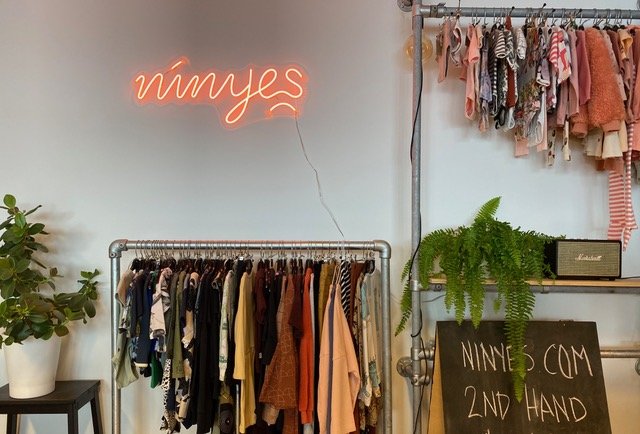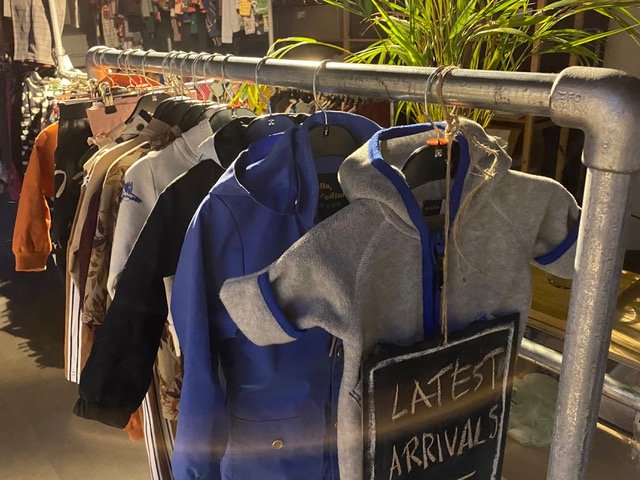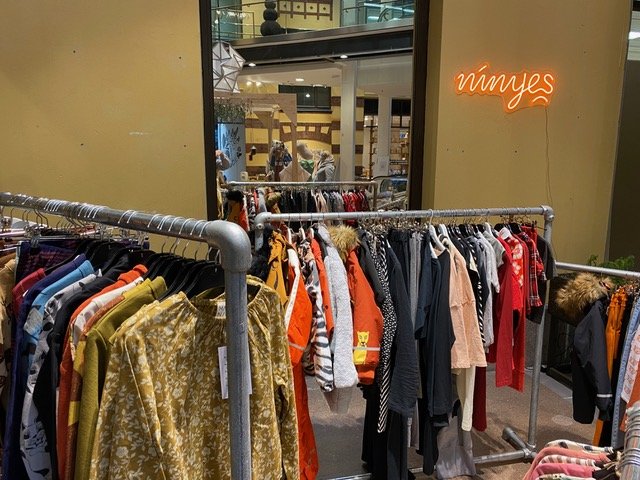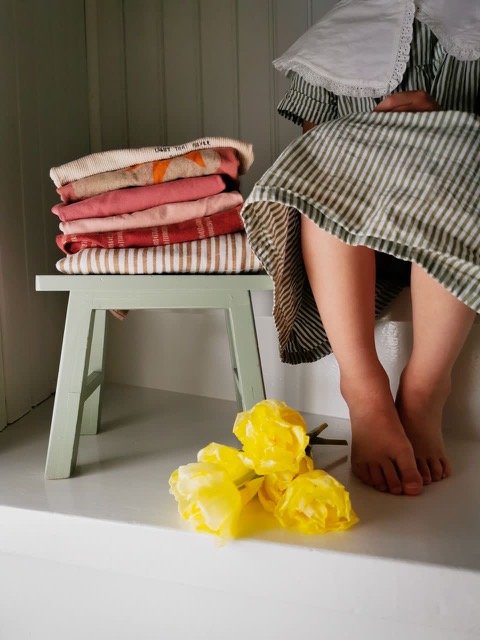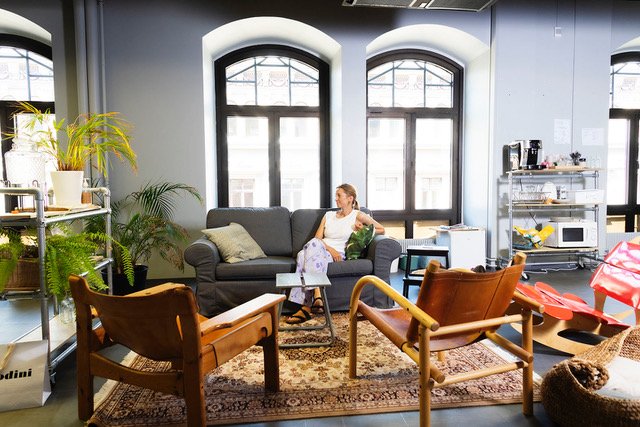INTERVIEW #58 NINYES
In paid partnership with Ninyes
Based in: Sweden, Denmark, Finland
Founded in: Helsinki in 2021
Founded by: Elina Aho & Mikko Siukosaari
Instagram: @ninyes
Shop at:
physical store in Helsinki
pop ups in Sweden and Denmark every now and then
recycling /takeback from Sweden, Denmark and Finland
shipping worldwide
Price range:
curated second-hand from originally responsible fashion brands
prices ca. 50% from new garment prices
Hello Ninyes, welcome to A Sustainable Closet. What is the story behind Ninyes, why did you founded the brand?
Elina had been an agent, an owner of physical stores and an online store founder for responsible kids’ wear for more than 10 years. Mikko, originally from the communications industry, had been a partner for two circular economy startups. Together we started visioning the next phase of the sustainable fashion business. We first tested a rental model but didn’t find a model that would please us. Then we tested a peer-to-peer model for second hand but realised that it didn’t solve our initial idea of making it really effortless for people to recycle their lesser-used garments.
As we had always been interested in finding a B2B model, we started piloting a resale model with two responsible kids’ wear brands in early 2021. It proved a success as both the brands liked it and the end customers found it extremely easy to use. After piloting and developing it for about a year, we launched the model in January 2022.
What does your resell model look like? Where do you get your garments from?
We offer a “resale-as-a-service” model for truly responsible fashion brands. This means that the brands can start taking back used garments from their customers and the customers will get vouchers in return that they can use to buy either second-hand or new clothes. The model is really easy to use both for the brands (it’s a plug & play model and we take care of all the work) and for the end customers as all they need to do is to pack and ship. We then control the clothes, price them, take the pictures, warehouse them and ultimately, together with the brands, find new owners for them. And another big thing for the customers is that they don’t need to wait until someone buys these clothes; they get their vouchers almost immediately after we have checked and priced the garments. So this must be the easiest and fastest way to “sell” your second-hand clothes. And possibly the most sustainable one as well.
What are your sustainability criteria? What must brands live up to in order to collaborate with Ninyes and help their customers to extend the life cycle of the garment?
We go through two main criteria with all our partner brands:
1. Materials: At least 75% of the materials are made from more sustainable materials, such as recycled fibers, organic cotton, Tencel, linen, recycled textiles or dead stock materials.
2. Production processes: At least 75% of collections are made in countries with low-risk working conditions (such as EU) or in factories that have a certification including requirements for working conditions (such as GOTS, fair trade or living wage programs).
Besides these, we don’t accept any brands that use animal produce unless it comes naturally from them such as mulesing-free wool. We also look for an overall commitment to sustainability so that all the brands have a clear commitment to becoming even more sustainable. They prove this with their sustainability strategies and reports. We monitor this development and are in constant contact with our partner brands.
Why is it beneficial for brands to partner with Ninyes? What are some of the feedback you have gotten from your partners?
Our model makes it possible for the brands to be part of the rapidly growing second-hand market of their own clothes. They can take responsibility for recycling the lesser used garments by providing a clever take-back system for their customers. They will also start earning new revenue from the second-hand market. The goal is to bring the brands about 10% extra revenue from a resale. This way they can grow not only by selling new products.
We now work with 15 brands and even if we are whole the time developing the system, the feedback is super positive. As one of our bigger partner brands put it recently: “For us, Ninyes was the best solution. Really easy to integrate into our systems, with no real set-up costs and super service ever since the beginning. Both our team and our customers just love it.”
Can you name a few of the brands that you accept and customers can shop pre-loved?
We accept and sell clothes from around 50 responsible fashion brands ranging from the bigger names such as Patagonia and Mini Rodini to some really sweet but newer ones such as Koi Kids or Kaiko. The customers can exchange their old clothes for vouchers from our 15 partner brands such as Ebbe Sweden, Papu or the above-mentioned Koi Kids and Kaiko.
What are some of the feedback you have gotten from your customers? What are the popular items?
In our recent customer survey, 95,1% of the respondents said they either find our service good or extremely good. The main feedback we keep getting is the easiness and speed of the service. We also hear a lot of positives about the fact that our curated second-hand collection only contains pieces that were originally responsibly made. In our understanding, we are the only clothing store in Europe with this type of “double sustainable” collection.
The most popular items of course vary during the season. In the past weeks, kids’ outdoor has been really popular but also some women’s dresses as people seem to be going on holidays to some warmer countries.
What have been the major challenges of starting your own resell company?
Getting a really new type of model through to both brands and the customers. You don’t really understand how easy it is to use before you test it. Everyone seems to be so used to waiting a few months before they get your money from the more well-known platforms or flea markets and also being forced to lower their prices constantly. With Ninyes you really get your voucher within 1-2 weeks always and you also get really good values.
What has been the largest gain?
Absolutely getting positive feedback from both our partner brands and customers. When you create a business model which is pretty new to the market, you always get really happy when you see that it really works and brings value and added sustainability to the world of fashion. Statistics say that about 50% of our wardrobes are not being used at all and if we can get those clothes into circulation, it will make a tremendous positive impact.
What do you think needs to change now in the fashion industry to make it more sustainable?
There are many things that need to be done as fast fashion and ultra-fast fashion brands just seem to be growing despite all the talk. We need more sustainable materials like Infinna and we need these materials to become more lasting and more mass-produced to fight cheap cotton, we need the big brands to stop greenwashing and putting most of their marketing money into their few somewhat sustainable collections and we need them to stop selling so cheaply. You should not be allowed to sell a t-shirt that costs less than 30€. Period. We need more and easier recycling systems and we need to make recycling profitable for both brands and customers. And ultimately, we need more and better information about what really is responsible fashion and what not.
What is “greenwashing” according to you and what can producers and consumers do to avoid it?
I don’t think we can expect all the consumers to know too deeply about sustainability so two things need to be done: 1) We need more and more inspiring information from sustainable brands (so that they become more interesting) and from other channels such as A Sustainable Closet. 2) We need pressure to the fast fashion brands from the EU and local governments so that they both stop their misleading campaigns but also stop their cheap production methods. We of course also need this pressure from consumers, influencers, retailers and other groups that can have an effect on this.
But since the Zara’s, H&M’s and Shein’s have all the money and all the marketing knowledge just as all the Marlboro’s and Camel’s had some time ago, we believe the only way to really make fast fashion suffer is to have taxes and official bans. Fast fashion is even worse than the cigarette business and if that business was reduced to the minimum by government control, we need to do the same to fast fashion and we need to do it quickly.
What would you advise consumers to do who seek to create a sustainable closet and lifestyle?
This is easy: Buy less new and when you buy, only buy pieces that have been responsibly made and last long and thus also have a good second-hand value. If you have an inventory in your closet, it should contain mainly the clothes that you use often.
What are the future plans for Ninyes?
We want to work with more brands and want to take Ninyes to new markets. We want more people to recycle.

